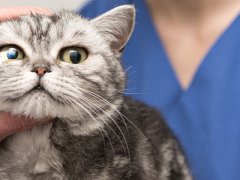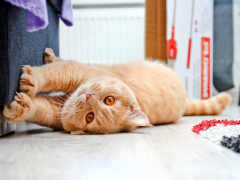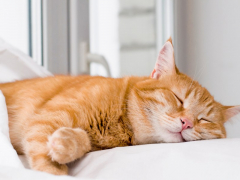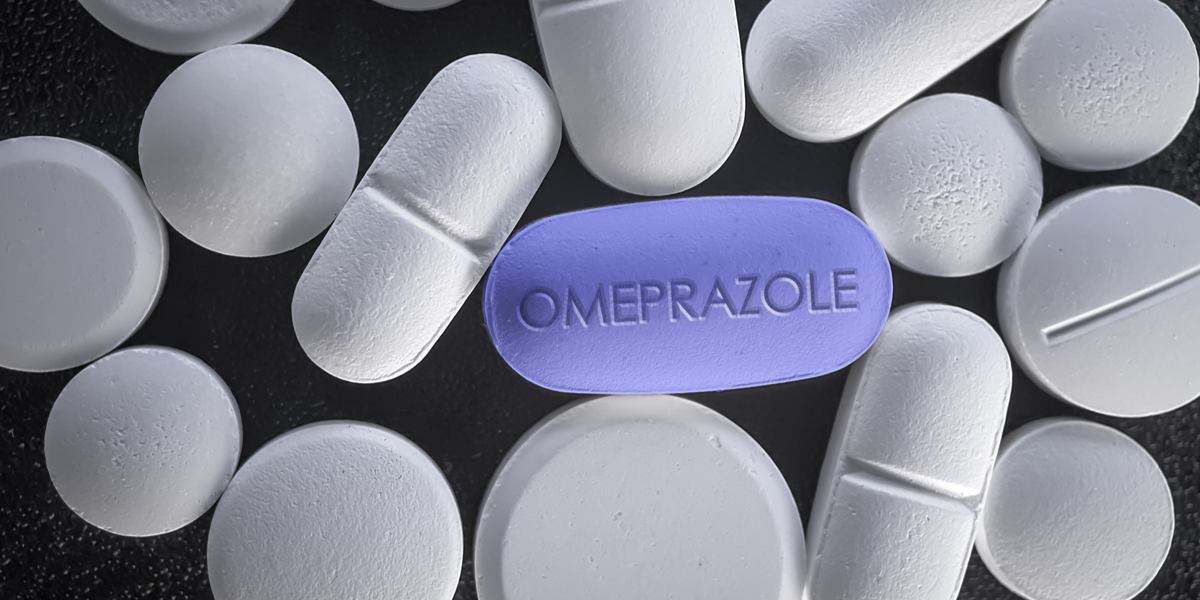
Omeprazole is a stomach acid reducing medication used commonly in veterinary medicine to assist with certain digestive disorders in cats, including mild gastritis as well as the prevention or treatment of stomach ulcers.
Prilosec is the most commonly recognized over-the-counter brand. In this article, you’ll learn what omeprazole is, how it works, dosing information, and some frequently asked questions.
Omeprazole for Cats Overview

About Omeprazole for Cats

Omeprazole is a medication called a proton pump inhibitor (PPI), which is a class of medications that work to reduce acid production in the stomach. When exposed to an acidic environment like the stomach, omeprazole binds to the parietal cells in the stomach wall that produce hydrochloric acid. Omeprazole then inhibits the transport of hydrogen ions, reportedly by over 90%.
Research, as well as clinical experience by many, has suggested that omeprazole is superior to famotidine (brand name Pepcid) when used for the same purposes of gastric acid reduction and stomach ulcer therapy.
What Does Omeprazole Do for Cats?

In general, omeprazole may be used in several ways. Although not an anti-emetic (anti-vomiting) drug, it can assist in bringing relief to cats with mild signs of nausea or stomach upset.
Omeprazole may also be used in situations where stomach ulcers are a concern. If the protective lining that shields the stomach tissue from its own acidic environment fails, the acid can literally lead to erosions in the wall.
Certain medical conditions may contribute to the presence of gastrointestinal ulceration, like (typically more severe) kidney or liver failure, and tumors present in the stomach or early small intestine.
Another common cause of stomach ulcerations in cats is the use of non-steroidal anti-inflammatory medications (NSAIDs). While there are some NSAIDs approved for short-term use in cats, longer-term use carries higher risks that an NSAID may interfere with the protective mechanisms of the stomach lining.
This risk is even higher with accidental use or ingestion of human NSAID medications like aspirin, ibuprofen (Advil) or naproxen sodium (Aleve).
Ingestion of other items may lead to gastritis or stomach inflammation. Gastritis leading to protracted vomiting may also increase the risk for the development of stomach ulcers. This can be caused by ingestion of irritating items or substances, like certain household plants as well as household cleaners and chemicals.
Omeprazole may be a recommended part of therapy for any of these situations. In some cases, such as if NSAID use is needed for a longer term period, it may be considered to help reduce the risk for ulcer development. In others, such as with ingestion of something that has severely irritated the stomach leading to concern ulcers may develop or may already be present, omeprazole may be considered as part of a treatment plan.
Side Effects of Omeprazole for Cats
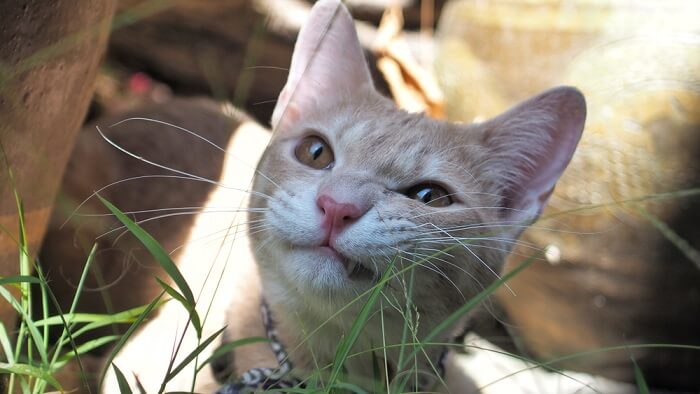
Side effects are uncommon, but some cats will experience digestive upset after using this medication.
Fortunately, cats tolerate omeprazole very well, and adverse effects are uncommon. However, ironically, signs of gastrointestinal upset are possible, including signs like lack of appetite, nausea, vomiting, and diarrhea.
Safety in regards to long-term use (months or years) may not be fully understood in pets, but the risks seen in humans that take omeprazole for extended periods are not thought to be seen nearly as often in cats.
Caution should be used in cats suffering from kidney or liver disease, especially in more advanced stages. The liver is used extensively to metabolize omeprazole and the kidneys are responsible for eliminating it from the body.
The presence of either liver or kidney disease may not only lead to omeprazole being less effective (because it won’t be metabolized as well) but additional stress may also be placed on these organs in their need to process it. In these cases, the use of omeprazole may be predicated on its benefits outweighing potential risks.
If omeprazole is already well-tolerated, overdoses of the medication are unlikely to cause significant concerns. Massive overdoses (doses equivalent to multiple over-the-counter omeprazole tablets) may still only require supportive care based on any effects that are seen.
If you are ever concerned that your kitty may have developed side effects while using omeprazole, or if an overdose is suspected, make sure to contact your veterinarian, the ASPCA Animal Poison Control Center (1-888-426-4435), or Pet Poison Helpline (1-855-764-7661) for further advice.
Omeprazole can have some interactions with other medications your cat may be on. This does not always mean toxicity. Omeprazole’s presence may also reduce stomach absorption of some medications. Always make sure to review any medications your cat is on with your veterinarian before considering the use of omeprazole.
Omeprazole for Cats Dosage
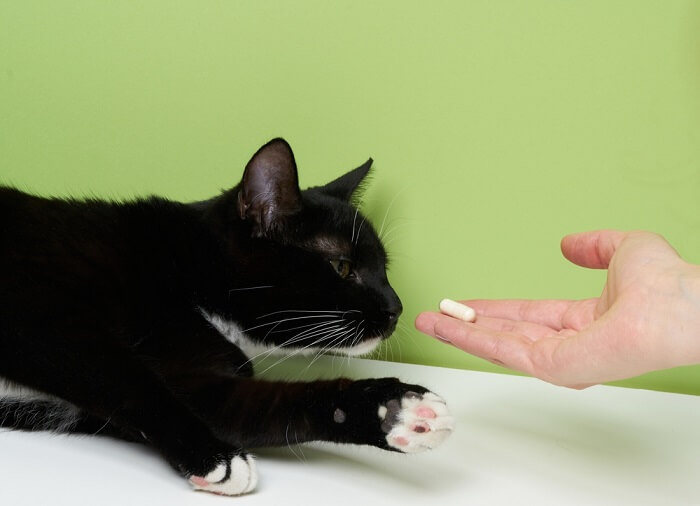
Use the omeprazole dosage recommended by your veterinarian. A common dose of omeprazole for an average 10-pound kitty is about 5mg, given every 12 hours.
Omeprazole is not FDA-approved for use in cats and is used off-label in kitties. You should always consult your veterinarian before use of omeprazole to determine the best dose based on weight as well as to discuss risks if your kitty has any concurrent medical conditions. The dose provided here is an average and should not be considered appropriate for all cats.
A common dose of omeprazole for an average 10-pound kitty is about 5mg, given every 12 hours. Over-the-counter omeprazole most commonly comes in 20mg tablet or capsule sizes, requiring tablets to be split. In cats, splitting enterically coated omeprazole tablets is acceptable to achieve the most appropriate dose.
Another method of dosing omeprazole to avoid splitting enterically coated tablets is to use the capsules. The capsules contain very small granules. The capsules can be opened, the granules emptied, and split up into an appropriate dosage amount, which can then be added to an empty gel capsule. This method requires more time and patience, and may also require a sharp tool to open the capsules.
Omeprazole may also be ordered through a compounding pharmacy in an appropriate dosage size of tablet or liquid form for a kitty. In cats where longer-term use of omeprazole is needed, this method may be best for providing adequate dosing.
Other forms of omeprazole, like GastroGard, which is a paste FDA-labeled for use in horses, contain doses considered far too high to be used in cats and are not practical.
Conclusion
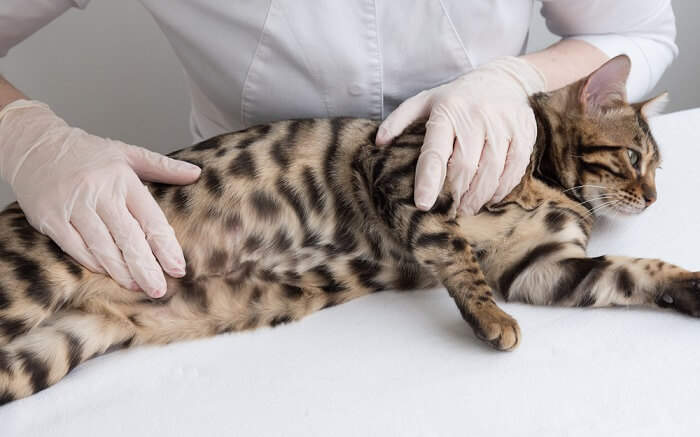
Omeprazole is an easy to acquire over-the-counter stomach acid-reducing medication that has several good applications for use in cats. However, it is often used as only a part of therapy along with other medications, and there may be some precautions using it in cats with kidney or liver disease or in cats on certain medications.
Although it’s an over-the-counter item, it’s still important to always discuss with your veterinarian before starting omeprazole both to discuss risks and benefits as well as to determine the dose most appropriate for your kitty.
Frequently Asked Questions
How Much Omeprazole Can a Cat Take?
For an average 10lb cat, 5mg of the over-the-counter tablet or capsule given every 12 hours, is very common. This does require splitting a tablet, as the common dosage size over-the-counter is 20mg. If your cat needs omeprazole for several days or longer, talk to your vet about dosing options, including having the medication compounded with a special pharmacy into the most accurate dose possible.
Why Do Vets Prescribe Omeprazole?
Most common situations revolve around bringing relief to stomach irritation causing mild nausea or vomiting, or as a way of helping to treat or prevent the formation of stomach ulcers. Stomach ulcers may result from ingestion of certain substances irritating to the stomach, certain medication conditions, or as a side effect of non-steroidal anti-inflammatory drug (NSAID) use.
What Helps Acid Reflux in Cats?
If a cat is suffering from over-production of acid in the stomach, it is important first to determine the underlying cause. Is there a dietary condition contributing? Is stress a factor? Is a kitty ingesting something in the home that is contributing?
Use of omeprazole as an acid-reducing medication may help with signs of acid reflux or overproduction, as it prevents the parietal cells in the stomach wall lining from producing acid.
What Are the Side Effects of Omeprazole?
Side effects in cats are uncommon, especially with shorter-term use. In uncommon cases, digestive upset signs like vomiting, nausea, and diarrhea may result. Long-term use appears to be better tolerated in pets compared to people, where use of daily omeprazole beyond 8 weeks is generally discouraged.
How Quickly Does Omeprazole Take to Work?
In humans, omeprazole can reach peak levels in the body within 30 minutes to just over 3 hours. However, in dogs, it may take 3-5 days for full benefits of stomach acid reduction to be seen. This may be similar in cats.
Is Omeprazole Safe for Animals?
Omeprazole is generally considered safe for use in many animals. It is FDA-approved for use in horses, with no significant side effects noted when used at appropriate doses.
In dogs and cats, omeprazole is used off-label, but experience has still shown that it provides more benefits than risks in most cases for stomach disorders, especially in the prevention or treatment of stomach ulcers.



